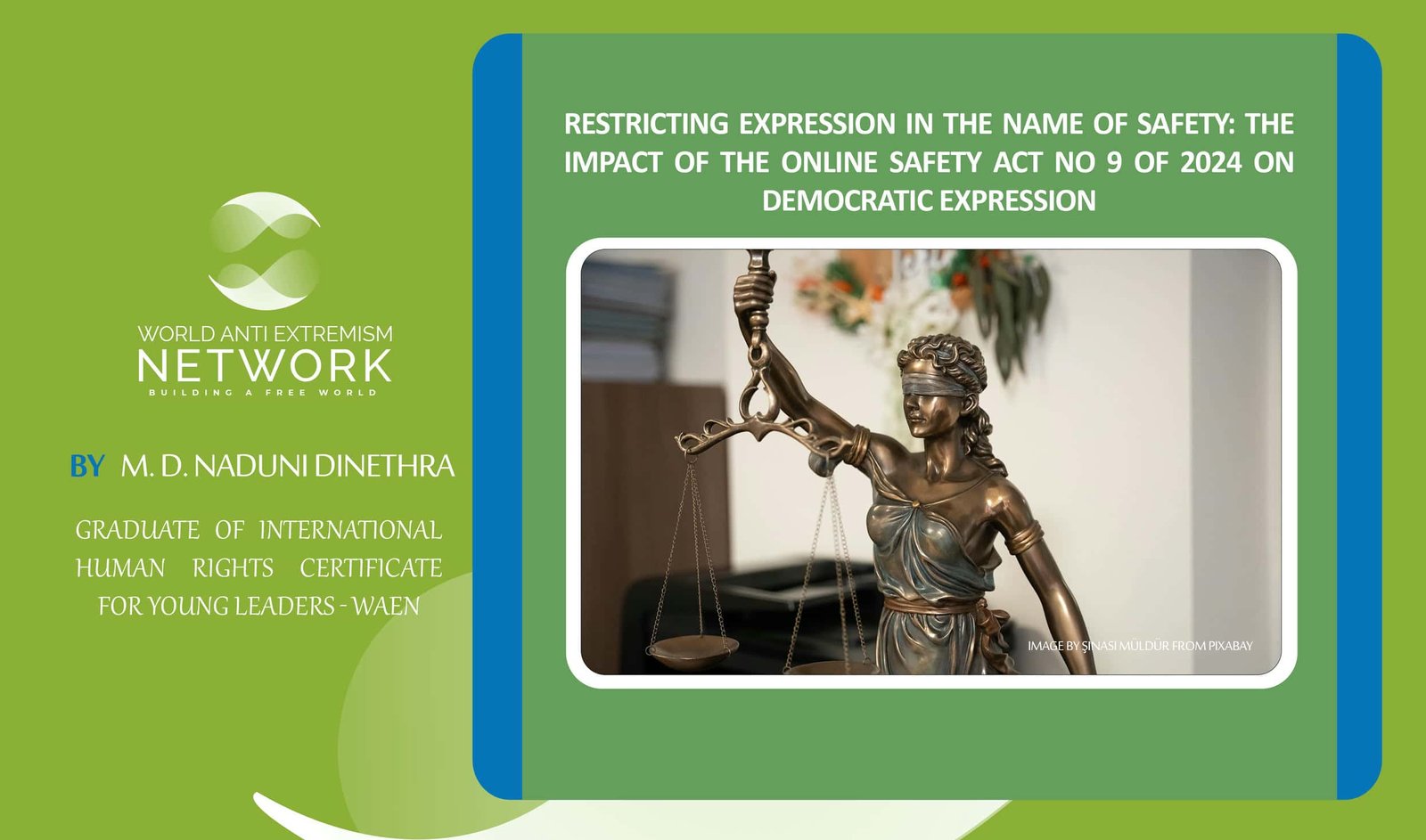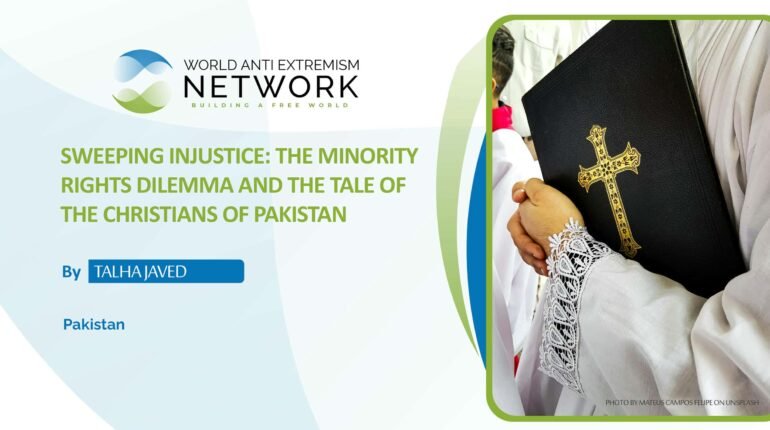Restricting Expression in the Name of Safety: The Impact of the Online Safety Act No 9 of 2024 on Democratic Expression
- World Anti Extremism Network
- Restricting Expression in the Name of Safety: The Impact of the Online Safety Act No 9 of 2024 on Democratic Expression

- Restricting Expression in the Name of Safety: The Impact of the Online Safety Act No 9 of 2024 on Democratic Expression
- By M. D. Naduni Dinethra
- Feb 12, 2025
Share on:
In a world with a particular knack for digital creations and change, with every comment and click building up a world of its own, online safety is of increasing relevance even in the most developed of states. Hence, protection in this aspect of one’s life would be considered essential by many. But would one have to make sacrifices to receive this protection? Or more importantly, what exactly is the meaning of the term ‘protection’? What exactly can one do in the name of protection?
It cannot be denied that Sri Lanka, being a developing country in the context of a constantly developing era of technological change and increased reliance of people on social media, would not suffer from a comprehensive piece of legislation that was specifically designed to address issues such as child endangerment on the internet or even issues such as defamation through online platforms. In this context, one may believe the Online Safety Bill is a response by the government to address such vulnerable aspects in the legislation. This does paint a comprehensive picture as to why the Act was drafted. Unfortunately, the picture most appear to see fade upon closer inspection because Sri Lankans soon realized that the Act was more than a work of ‘protection’; it was the creation of an avenue ensuring that ‘unwanted expressions’ remain silenced while simultaneously attempting to resolve real threats in an attempt to demonstrate democracy and goodwill.
Given that Article 121 provides citizens the opportunity to question the constitutionality of a Bill, 51 petitions were filed against this Bill to the Supreme Court, which marks the highest number of petitions filed against a single draft Bill in the country. Given the overwhelming opposition that stepped forward against this legislation, it is evident that concerns over the freedom of expression are far from unfounded.
The Act penalizes the use of any ‘prohibited statements’ being made for the benefit of public order and national security. The actual impact of such words can leave a profound impact given that section 3, in attempting to define what amounts to these ‘prohibited statements’ leaves significant room for discretion to the ‘Online Safety Commission’ to decide what would amount to such a statement. Indeed, stating that any statement that is “false, misleading or likely to incite violence or hatred” is highly subjective to the point that even constructive criticism can be interpreted in the form of ‘inciting hatred’ by implying that the person being given such comment is performing their work in a subpar fashion. Now although this is a hypothetical accusation, the alarming aspect is that it remains effortless to come up with unreasonable yet legit allegations of misconduct based on a few words in the Act.
The severe penalties that are imposed for the ‘dissemination of false information’ including fines and imprisonment, have a far-reaching impact of deterring journalists or even activists from reporting controversial issues in fear of retribution. Although the spread of false information is indeed something to be penalized, in this context it is a double-edged sword that can target forms of expression such as journalism and whistleblowers, thus significantly undermining transparency and goodwill in governance.
Behind every long-lasting and stable democracy is the constant need for checks and balances between the nation’s branches of government. This means that governmental institutions, be it the legislature which makes laws, the executive which creates policies and executes laws, or the judiciary which enforces and interprets law, must consistently ensure that no one branch or individual is acquiring too much power. Indeed, concentrating too much power in a single institution or individual is like intentionally spraying seeds of decay in a glowing garden of democracy because history has repeatedly shown that people, in the face of excessive power, become far from noble through examples such as Hitler or even Pol Pot. The concentration of power is a major cause of concern about the Online Safety Commission established under section 7. The extensive powers given to the commission, including the right to monitor and regulate online content, means that there is a concerning centralization of power which could lead to abuse and overreach of such authority, especially with the lack of checks and balances in this context.
The formulation of this Act seems to be just another episode of the Sedition Act of 1948 which was enacted in Malaysia. Originally the Act was brought to force by the British colonial government to suppress dissent and maintain control but even after Malaysia gained independence, successive governments continued to use it. The Act criminalizes speech that has a ‘seditious tendency’, which included condemnation or contempt of the government, promotion of hostility between different ethnic groups and even questioning certain aspects of the constitution. Until recently this Act was directly used as a weapon to arrest and prosecute political opponents and even activists and journalists. However, even after it was amended to not deem criticism of the government a ‘seditious activity’, at the same time the amendments have also increased the time of imprisonment from three to seven years if a seditious activity is committed.
Despite amendments to the Sedition Act in 2015, concerns over retribution for expressing views on sensitive topics, particularly regarding the monarchy, persist. The Act continues to allow for a broad interpretation of what amounts to sedition while increasing the penalties for actions deemed seditious. Fear of prosecution stifles the voices of many to this day by a piece of legislation introduced over 50 years ago. It is clear that the episode of the introduction of the Sedition Act has continued to influence the seasons of rulers and continues to do so to this day. Once enacted, it is law and one who comes to power does not wish to repeal this Act in the name of good leadership because the veil of protection and security it offers to one’s position of power is too great to lose. The question that remains, however, is will the Online Safety Act recreates the ongoing episode featuring the Sedition Act in Malaysia again in Sri Lanka.
In August 2024, the Online Safety Commission flagged several articles from a prominent independent media outlet called ‘Sri Lanka Today as containing ‘false information’ and ‘prohibited statements’ which were said to threaten national security and public order. The outlet remained shut for two weeks during which its website was inaccessible. Many argue that this was a motivated attack on the outlet given that it reported politically sensitive issues and was also critical of how the government was handling the economic crisis which plagued Sri Lanka. This incident has now led to increased self-censorship among journalists and even media outlets of the country who are in fear of repercussions if they report sensitive issues or even express a subjective opinion.
Hence, it is important to note that the broader implications of the Act may be unwarranted by many. In attempting to safeguard national security and public order, if public expression and national freedom should be suppressed to extreme extents, then would it not be questionable to what extent the Act can truly achieve a democratically approved peace and security as opposed to a ‘chilling effect on free speech’ that occurs due to fear of retribution? Yes, online safety is of paramount importance but the question remains, at what cost are we achieving it, if at all? According to Dr. Sanjana Hattotuwa, the Research Director of The Disinformation Project in New Zealand, “To believe that the Online Safety Act is going to stop planned, targeted, sustained attacks on social media is farcical”. If this is so, then what can we expect the Online Safety Act to do? What was it meant to do?

About the Author
Naduni is a graduate of the University of London with a Bachelor of Laws (Hons) and a passionate advocate for human rights and sustainable development. With experience in legal policy research, Naduni is serving as the Head of the Committee on Research and Policy at the Journal on Asian Legal Policy and Sustainable Development and has served as a part of the organizing committee of South Asian Conference on Higher Legal Education and Sustainable Development, also having contributed to social initiatives such as fundraising for HelpAge. Committed to fostering dialogue and creating a better legal framework on a global scale, Naduni is currently expanding her expertise by pursuing further studies in human rights.
The opinions expressed in these articles are solely those of the authors and do not reflect the views or positions of the organization. If you find any information incorrect, please contact (research@worldantiextremism.org), and we would be happy to assist you. You can download, distribute, and reuse this work, provided you credit the author and cite the original source.
Related Articles
Subscribe to our newsletter and stay updated.
Contact
Toronto, Ontario, M1L 0E5 Canada
Subscribe to our newsletter and stay updated.
Contact
Toronto, Ontario, M1L 0E5 Canada
Subscribe to our newsletter and stay updated.
Contact
Toronto, Ontario, M1L 0E5 Canada






